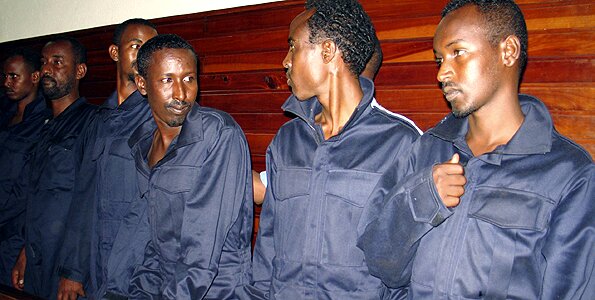
Somali pirates
Bartamaha (Nairobi):-Piracy and the big money being made out of it is seeping into Kenya’s economic fabric, presenting a serious threat to the economy as well as law and order, experts warn.
nvestigations by the Daily Nation suggest that Kenyan law firms, security, aviation and shipping companies are doing business with pirates rampaging in the Indian Ocean.
More than $80 million (Sh6.5 billion) is paid to Somali pirates as ransom annually, some of which is thought to pass through Kenya.
Economy
The piracy, which is being fuelled by lack of an effective central government in Mogadishu, is costing the world economy up to $18 billion (Sh1.45 trillion) each year, according to International Maritime Bureau estimates.
Kenyan companies are acting as the link between the pirates and representatives of hijacked ship owners, facilitating ransom negotiations and payment.
The programmes coordinator of the Seafarers Assistance Programme (SAP), Mr Andrew Mwangura, whose organisation protects the right of seamen on hijacked ships, confirms that millions of dollars exchange hands between pirates and ship owners, but declines to discuss details.
“It is true owners of hijacked ships are paying pirates to secure the release of their ships and crew members held hostage with most of the money passing through Kenya, but I cannot discuss details because we are not involved in this transactions as our role only concerns the welfare of seamen,†he said.
Seven syndicates
A report by the World Peace Foundation, an international think-tank bringing together scholars, diplomats, lawyers, military officers and maritime partners working on an initiative to combat piracy, claims that Kenya is among countries whose firms play a key role in driving piracy along the Somali coast.
The report says that piracy in Somalia is controlled by about 1,500 pirates, organised in seven syndicates with a “few bosses†running separate but linked enterprises. They are all largely run from Kenya, Dubai, Lebanon, Somalia and some European countries, the report claims.
The report says the largest ransom amount the pirates had received so far was Sh574 million or $7 million paid for the release of a Greek-owned oil tanker early this year.
A maritime official, who talked to the Nation on condition that he is not named because of the sensitivity of the issue, said they were aware of the role a select few law, security, aviation and shipping companies in Mombasa and Nairobi played in facilitating the release of hijacked ships and payment of ransoms.
“The law and security firms facilitate negotiations and preparation of agreements, while aviation and shipping companies deliver ransom payments to the pirates in Somalia,†he said. He said ransom money is obtained from agents of hijacked ships either in Nairobi or Mombasa before it is taken either by air or sea to the pirates.
Tight security
“The money is either delivered to private airstrips around Nairobi from where it is flown and dropped to pirates on hijacked ships or is loaded on ships that go to Somalia from Mombasa port to deliver,†he said.
He said at times, the ransom payments are transported in the middle of the night under tight security from Nairobi to Mombasa before it is delivered to a ship to take it to Somalia.
“Once such missions have been accomplished, the pirates pay the law, security, aviation and shipping firms involved through their agents in Nairobi and Mombasa through an unofficial money remittance system called Hawala,†he said.
The Hawala system is based on trust and was initially widely used by a network of money brokers in the Middle East and Africa, but is now popular in Europe and even North America.
According to a US State Department report, Kenya is a money-laundering hub in Africa. The International Narcotics Control Strategy Report says Kenya’s financial system may be laundering over Sh8 billion or $ 100 million annually.
————————-
Source:- Daily Nation



